Line Managers and Employee Development in Sainsbury's - A Study
VerifiedAdded on 2023/06/13
|28
|5921
|332
Report
AI Summary
This report investigates the role of line managers and leaders in employee development within Sainsbury's. It aims to identify the responsibilities executed by these managers, the efforts they exert in developing employees, and the advantages gained by Sainsbury's through effective talent management strategies. The research employs a deductive approach and survey methodology, utilizing questionnaires to gather data. The findings highlight the importance of line managers in motivating employees, fostering a positive work environment, and providing growth opportunities. The report concludes that effective talent management strategies, such as utilizing resources properly, improving employee engagement, and enhancing employee retention, are crucial for Sainsbury's success in the competitive business environment. This study serves as a valuable resource for companies, students, professionals, and researchers interested in talent management and leadership practices.
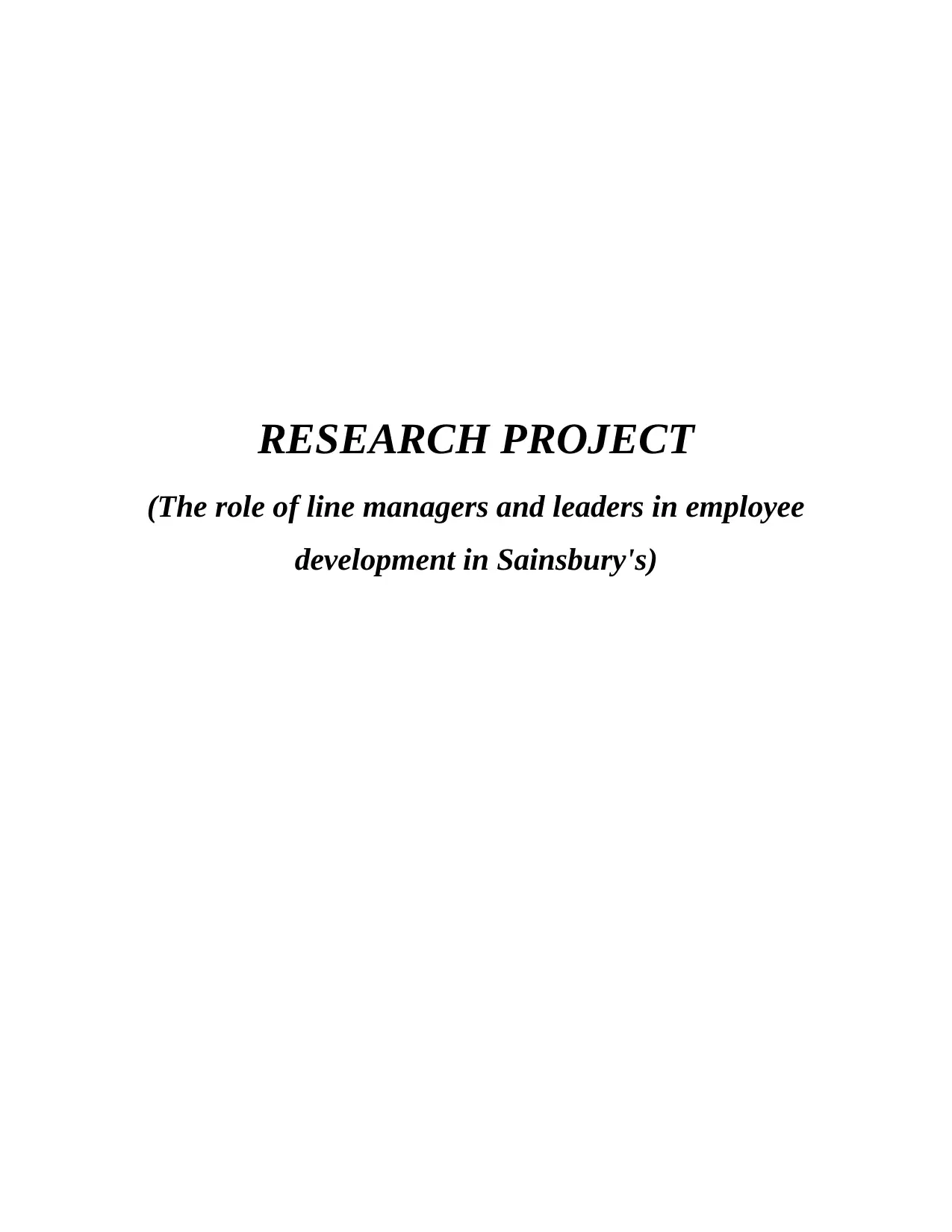
RESEARCH PROJECT
(The role of line managers and leaders in employee
development in Sainsbury's)
(The role of line managers and leaders in employee
development in Sainsbury's)
Paraphrase This Document
Need a fresh take? Get an instant paraphrase of this document with our AI Paraphraser
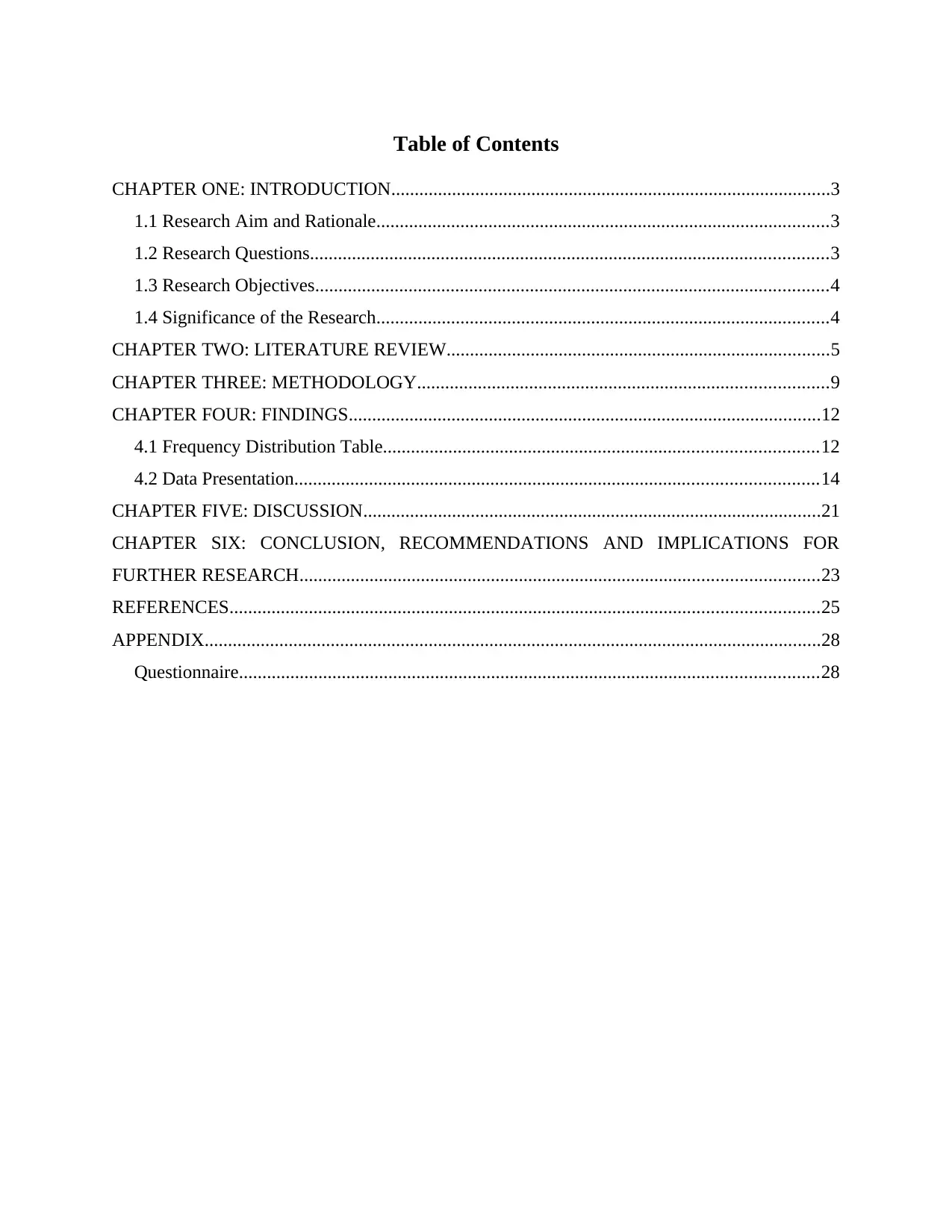
Table of Contents
CHAPTER ONE: INTRODUCTION..............................................................................................3
1.1 Research Aim and Rationale.................................................................................................3
1.2 Research Questions...............................................................................................................3
1.3 Research Objectives..............................................................................................................4
1.4 Significance of the Research.................................................................................................4
CHAPTER TWO: LITERATURE REVIEW..................................................................................5
CHAPTER THREE: METHODOLOGY........................................................................................9
CHAPTER FOUR: FINDINGS.....................................................................................................12
4.1 Frequency Distribution Table.............................................................................................12
4.2 Data Presentation................................................................................................................14
CHAPTER FIVE: DISCUSSION..................................................................................................21
CHAPTER SIX: CONCLUSION, RECOMMENDATIONS AND IMPLICATIONS FOR
FURTHER RESEARCH...............................................................................................................23
REFERENCES..............................................................................................................................25
APPENDIX....................................................................................................................................28
Questionnaire............................................................................................................................28
CHAPTER ONE: INTRODUCTION..............................................................................................3
1.1 Research Aim and Rationale.................................................................................................3
1.2 Research Questions...............................................................................................................3
1.3 Research Objectives..............................................................................................................4
1.4 Significance of the Research.................................................................................................4
CHAPTER TWO: LITERATURE REVIEW..................................................................................5
CHAPTER THREE: METHODOLOGY........................................................................................9
CHAPTER FOUR: FINDINGS.....................................................................................................12
4.1 Frequency Distribution Table.............................................................................................12
4.2 Data Presentation................................................................................................................14
CHAPTER FIVE: DISCUSSION..................................................................................................21
CHAPTER SIX: CONCLUSION, RECOMMENDATIONS AND IMPLICATIONS FOR
FURTHER RESEARCH...............................................................................................................23
REFERENCES..............................................................................................................................25
APPENDIX....................................................................................................................................28
Questionnaire............................................................................................................................28
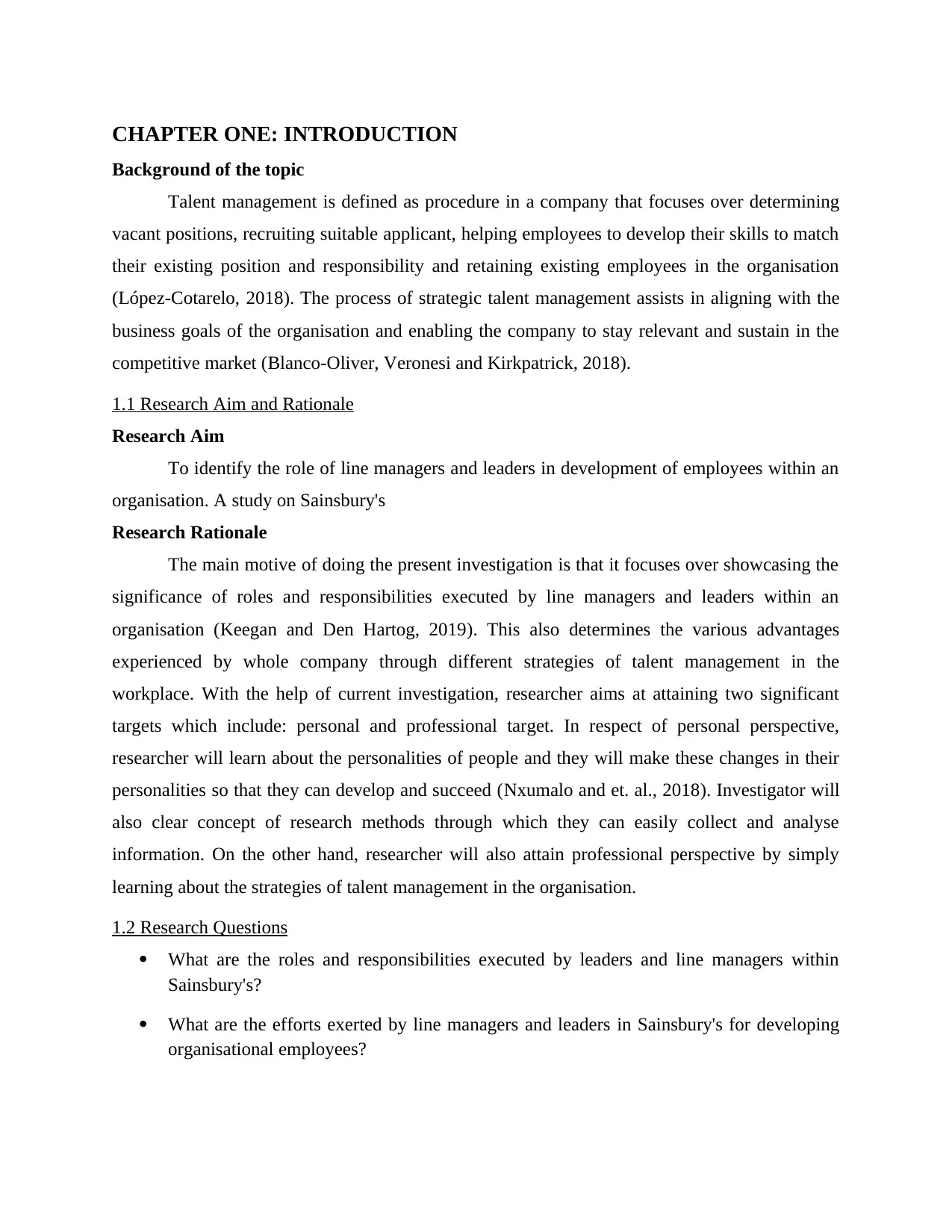
CHAPTER ONE: INTRODUCTION
Background of the topic
Talent management is defined as procedure in a company that focuses over determining
vacant positions, recruiting suitable applicant, helping employees to develop their skills to match
their existing position and responsibility and retaining existing employees in the organisation
(López‐Cotarelo, 2018). The process of strategic talent management assists in aligning with the
business goals of the organisation and enabling the company to stay relevant and sustain in the
competitive market (Blanco-Oliver, Veronesi and Kirkpatrick, 2018).
1.1 Research Aim and Rationale
Research Aim
To identify the role of line managers and leaders in development of employees within an
organisation. A study on Sainsbury's
Research Rationale
The main motive of doing the present investigation is that it focuses over showcasing the
significance of roles and responsibilities executed by line managers and leaders within an
organisation (Keegan and Den Hartog, 2019). This also determines the various advantages
experienced by whole company through different strategies of talent management in the
workplace. With the help of current investigation, researcher aims at attaining two significant
targets which include: personal and professional target. In respect of personal perspective,
researcher will learn about the personalities of people and they will make these changes in their
personalities so that they can develop and succeed (Nxumalo and et. al., 2018). Investigator will
also clear concept of research methods through which they can easily collect and analyse
information. On the other hand, researcher will also attain professional perspective by simply
learning about the strategies of talent management in the organisation.
1.2 Research Questions
What are the roles and responsibilities executed by leaders and line managers within
Sainsbury's?
What are the efforts exerted by line managers and leaders in Sainsbury's for developing
organisational employees?
Background of the topic
Talent management is defined as procedure in a company that focuses over determining
vacant positions, recruiting suitable applicant, helping employees to develop their skills to match
their existing position and responsibility and retaining existing employees in the organisation
(López‐Cotarelo, 2018). The process of strategic talent management assists in aligning with the
business goals of the organisation and enabling the company to stay relevant and sustain in the
competitive market (Blanco-Oliver, Veronesi and Kirkpatrick, 2018).
1.1 Research Aim and Rationale
Research Aim
To identify the role of line managers and leaders in development of employees within an
organisation. A study on Sainsbury's
Research Rationale
The main motive of doing the present investigation is that it focuses over showcasing the
significance of roles and responsibilities executed by line managers and leaders within an
organisation (Keegan and Den Hartog, 2019). This also determines the various advantages
experienced by whole company through different strategies of talent management in the
workplace. With the help of current investigation, researcher aims at attaining two significant
targets which include: personal and professional target. In respect of personal perspective,
researcher will learn about the personalities of people and they will make these changes in their
personalities so that they can develop and succeed (Nxumalo and et. al., 2018). Investigator will
also clear concept of research methods through which they can easily collect and analyse
information. On the other hand, researcher will also attain professional perspective by simply
learning about the strategies of talent management in the organisation.
1.2 Research Questions
What are the roles and responsibilities executed by leaders and line managers within
Sainsbury's?
What are the efforts exerted by line managers and leaders in Sainsbury's for developing
organisational employees?
⊘ This is a preview!⊘
Do you want full access?
Subscribe today to unlock all pages.

Trusted by 1+ million students worldwide
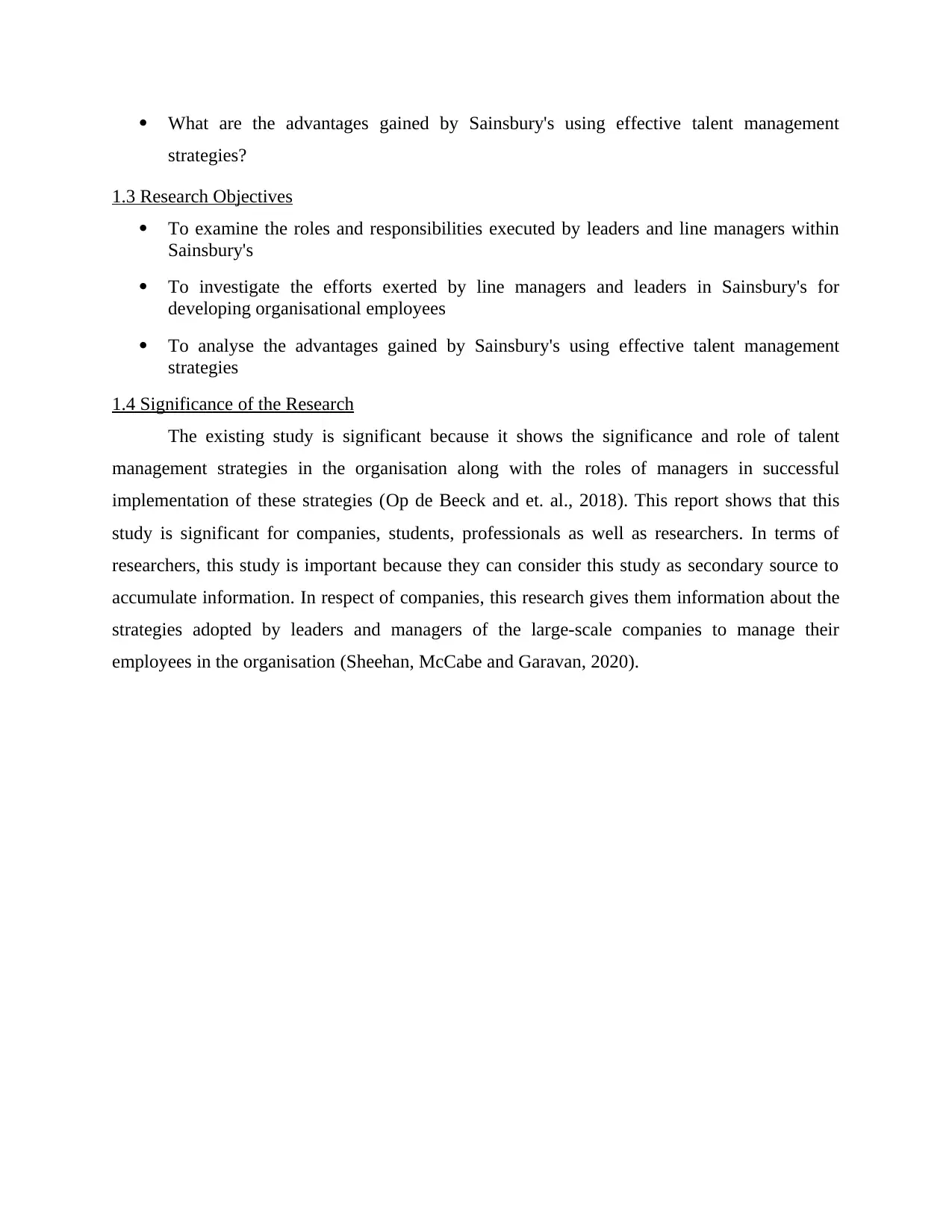
What are the advantages gained by Sainsbury's using effective talent management
strategies?
1.3 Research Objectives
To examine the roles and responsibilities executed by leaders and line managers within
Sainsbury's
To investigate the efforts exerted by line managers and leaders in Sainsbury's for
developing organisational employees
To analyse the advantages gained by Sainsbury's using effective talent management
strategies
1.4 Significance of the Research
The existing study is significant because it shows the significance and role of talent
management strategies in the organisation along with the roles of managers in successful
implementation of these strategies (Op de Beeck and et. al., 2018). This report shows that this
study is significant for companies, students, professionals as well as researchers. In terms of
researchers, this study is important because they can consider this study as secondary source to
accumulate information. In respect of companies, this research gives them information about the
strategies adopted by leaders and managers of the large-scale companies to manage their
employees in the organisation (Sheehan, McCabe and Garavan, 2020).
strategies?
1.3 Research Objectives
To examine the roles and responsibilities executed by leaders and line managers within
Sainsbury's
To investigate the efforts exerted by line managers and leaders in Sainsbury's for
developing organisational employees
To analyse the advantages gained by Sainsbury's using effective talent management
strategies
1.4 Significance of the Research
The existing study is significant because it shows the significance and role of talent
management strategies in the organisation along with the roles of managers in successful
implementation of these strategies (Op de Beeck and et. al., 2018). This report shows that this
study is significant for companies, students, professionals as well as researchers. In terms of
researchers, this study is important because they can consider this study as secondary source to
accumulate information. In respect of companies, this research gives them information about the
strategies adopted by leaders and managers of the large-scale companies to manage their
employees in the organisation (Sheehan, McCabe and Garavan, 2020).
Paraphrase This Document
Need a fresh take? Get an instant paraphrase of this document with our AI Paraphraser
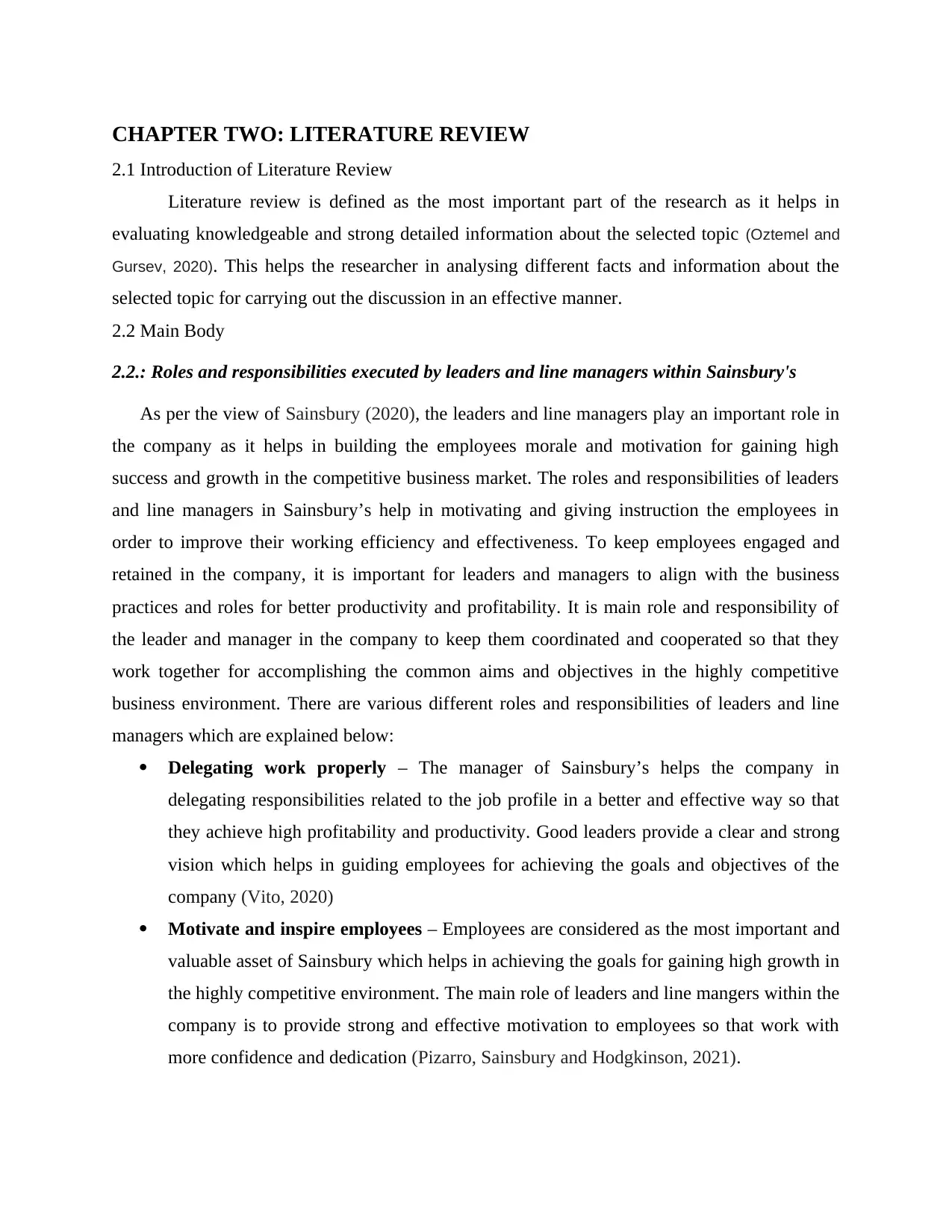
CHAPTER TWO: LITERATURE REVIEW
2.1 Introduction of Literature Review
Literature review is defined as the most important part of the research as it helps in
evaluating knowledgeable and strong detailed information about the selected topic (Oztemel and
Gursev, 2020). This helps the researcher in analysing different facts and information about the
selected topic for carrying out the discussion in an effective manner.
2.2 Main Body
2.2.: Roles and responsibilities executed by leaders and line managers within Sainsbury's
As per the view of Sainsbury (2020), the leaders and line managers play an important role in
the company as it helps in building the employees morale and motivation for gaining high
success and growth in the competitive business market. The roles and responsibilities of leaders
and line managers in Sainsbury’s help in motivating and giving instruction the employees in
order to improve their working efficiency and effectiveness. To keep employees engaged and
retained in the company, it is important for leaders and managers to align with the business
practices and roles for better productivity and profitability. It is main role and responsibility of
the leader and manager in the company to keep them coordinated and cooperated so that they
work together for accomplishing the common aims and objectives in the highly competitive
business environment. There are various different roles and responsibilities of leaders and line
managers which are explained below:
Delegating work properly – The manager of Sainsbury’s helps the company in
delegating responsibilities related to the job profile in a better and effective way so that
they achieve high profitability and productivity. Good leaders provide a clear and strong
vision which helps in guiding employees for achieving the goals and objectives of the
company (Vito, 2020)
Motivate and inspire employees – Employees are considered as the most important and
valuable asset of Sainsbury which helps in achieving the goals for gaining high growth in
the highly competitive environment. The main role of leaders and line mangers within the
company is to provide strong and effective motivation to employees so that work with
more confidence and dedication (Pizarro, Sainsbury and Hodgkinson, 2021).
2.1 Introduction of Literature Review
Literature review is defined as the most important part of the research as it helps in
evaluating knowledgeable and strong detailed information about the selected topic (Oztemel and
Gursev, 2020). This helps the researcher in analysing different facts and information about the
selected topic for carrying out the discussion in an effective manner.
2.2 Main Body
2.2.: Roles and responsibilities executed by leaders and line managers within Sainsbury's
As per the view of Sainsbury (2020), the leaders and line managers play an important role in
the company as it helps in building the employees morale and motivation for gaining high
success and growth in the competitive business market. The roles and responsibilities of leaders
and line managers in Sainsbury’s help in motivating and giving instruction the employees in
order to improve their working efficiency and effectiveness. To keep employees engaged and
retained in the company, it is important for leaders and managers to align with the business
practices and roles for better productivity and profitability. It is main role and responsibility of
the leader and manager in the company to keep them coordinated and cooperated so that they
work together for accomplishing the common aims and objectives in the highly competitive
business environment. There are various different roles and responsibilities of leaders and line
managers which are explained below:
Delegating work properly – The manager of Sainsbury’s helps the company in
delegating responsibilities related to the job profile in a better and effective way so that
they achieve high profitability and productivity. Good leaders provide a clear and strong
vision which helps in guiding employees for achieving the goals and objectives of the
company (Vito, 2020)
Motivate and inspire employees – Employees are considered as the most important and
valuable asset of Sainsbury which helps in achieving the goals for gaining high growth in
the highly competitive environment. The main role of leaders and line mangers within the
company is to provide strong and effective motivation to employees so that work with
more confidence and dedication (Pizarro, Sainsbury and Hodgkinson, 2021).
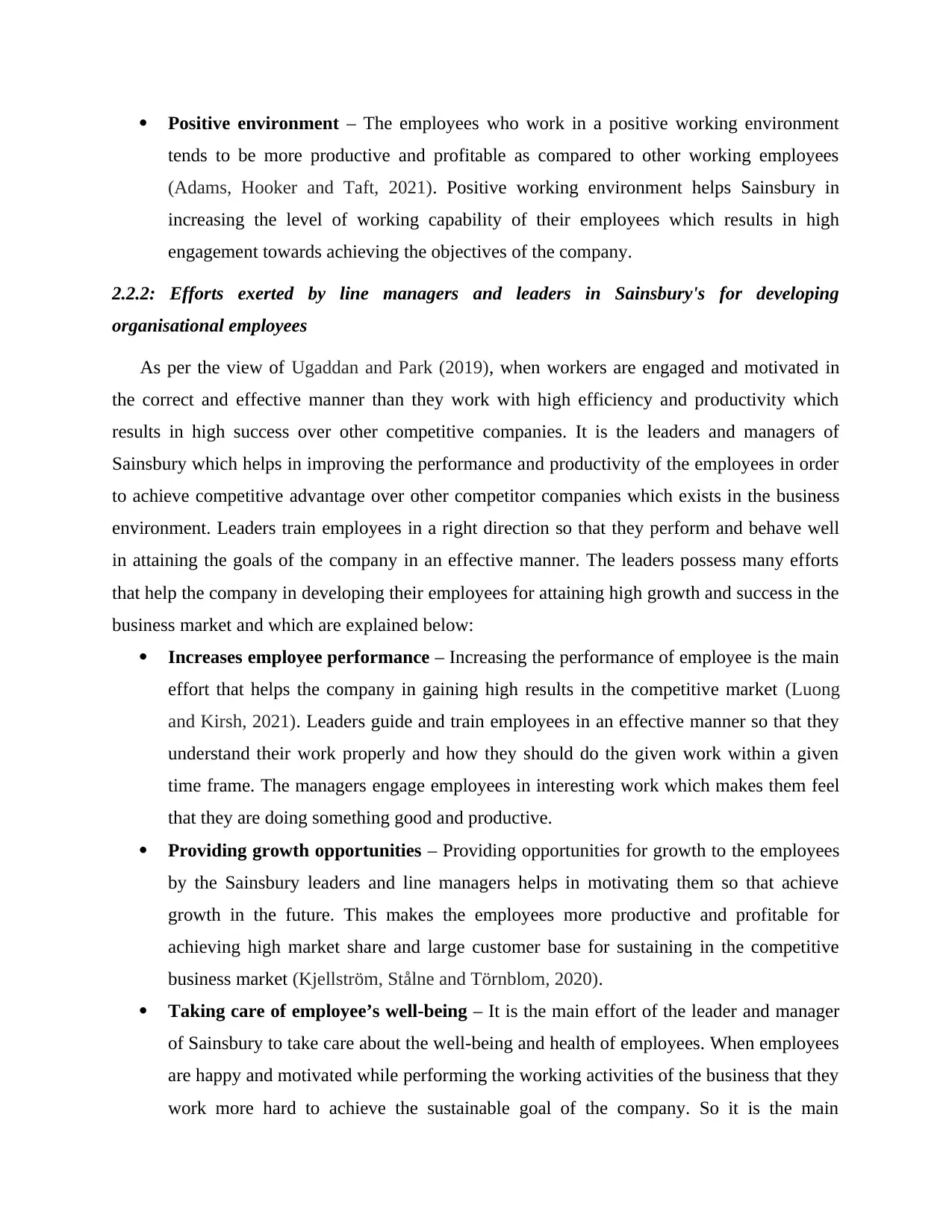
Positive environment – The employees who work in a positive working environment
tends to be more productive and profitable as compared to other working employees
(Adams, Hooker and Taft, 2021). Positive working environment helps Sainsbury in
increasing the level of working capability of their employees which results in high
engagement towards achieving the objectives of the company.
2.2.2: Efforts exerted by line managers and leaders in Sainsbury's for developing
organisational employees
As per the view of Ugaddan and Park (2019), when workers are engaged and motivated in
the correct and effective manner than they work with high efficiency and productivity which
results in high success over other competitive companies. It is the leaders and managers of
Sainsbury which helps in improving the performance and productivity of the employees in order
to achieve competitive advantage over other competitor companies which exists in the business
environment. Leaders train employees in a right direction so that they perform and behave well
in attaining the goals of the company in an effective manner. The leaders possess many efforts
that help the company in developing their employees for attaining high growth and success in the
business market and which are explained below:
Increases employee performance – Increasing the performance of employee is the main
effort that helps the company in gaining high results in the competitive market (Luong
and Kirsh, 2021). Leaders guide and train employees in an effective manner so that they
understand their work properly and how they should do the given work within a given
time frame. The managers engage employees in interesting work which makes them feel
that they are doing something good and productive.
Providing growth opportunities – Providing opportunities for growth to the employees
by the Sainsbury leaders and line managers helps in motivating them so that achieve
growth in the future. This makes the employees more productive and profitable for
achieving high market share and large customer base for sustaining in the competitive
business market (Kjellström, Stålne and Törnblom, 2020).
Taking care of employee’s well-being – It is the main effort of the leader and manager
of Sainsbury to take care about the well-being and health of employees. When employees
are happy and motivated while performing the working activities of the business that they
work more hard to achieve the sustainable goal of the company. So it is the main
tends to be more productive and profitable as compared to other working employees
(Adams, Hooker and Taft, 2021). Positive working environment helps Sainsbury in
increasing the level of working capability of their employees which results in high
engagement towards achieving the objectives of the company.
2.2.2: Efforts exerted by line managers and leaders in Sainsbury's for developing
organisational employees
As per the view of Ugaddan and Park (2019), when workers are engaged and motivated in
the correct and effective manner than they work with high efficiency and productivity which
results in high success over other competitive companies. It is the leaders and managers of
Sainsbury which helps in improving the performance and productivity of the employees in order
to achieve competitive advantage over other competitor companies which exists in the business
environment. Leaders train employees in a right direction so that they perform and behave well
in attaining the goals of the company in an effective manner. The leaders possess many efforts
that help the company in developing their employees for attaining high growth and success in the
business market and which are explained below:
Increases employee performance – Increasing the performance of employee is the main
effort that helps the company in gaining high results in the competitive market (Luong
and Kirsh, 2021). Leaders guide and train employees in an effective manner so that they
understand their work properly and how they should do the given work within a given
time frame. The managers engage employees in interesting work which makes them feel
that they are doing something good and productive.
Providing growth opportunities – Providing opportunities for growth to the employees
by the Sainsbury leaders and line managers helps in motivating them so that achieve
growth in the future. This makes the employees more productive and profitable for
achieving high market share and large customer base for sustaining in the competitive
business market (Kjellström, Stålne and Törnblom, 2020).
Taking care of employee’s well-being – It is the main effort of the leader and manager
of Sainsbury to take care about the well-being and health of employees. When employees
are happy and motivated while performing the working activities of the business that they
work more hard to achieve the sustainable goal of the company. So it is the main
⊘ This is a preview!⊘
Do you want full access?
Subscribe today to unlock all pages.

Trusted by 1+ million students worldwide
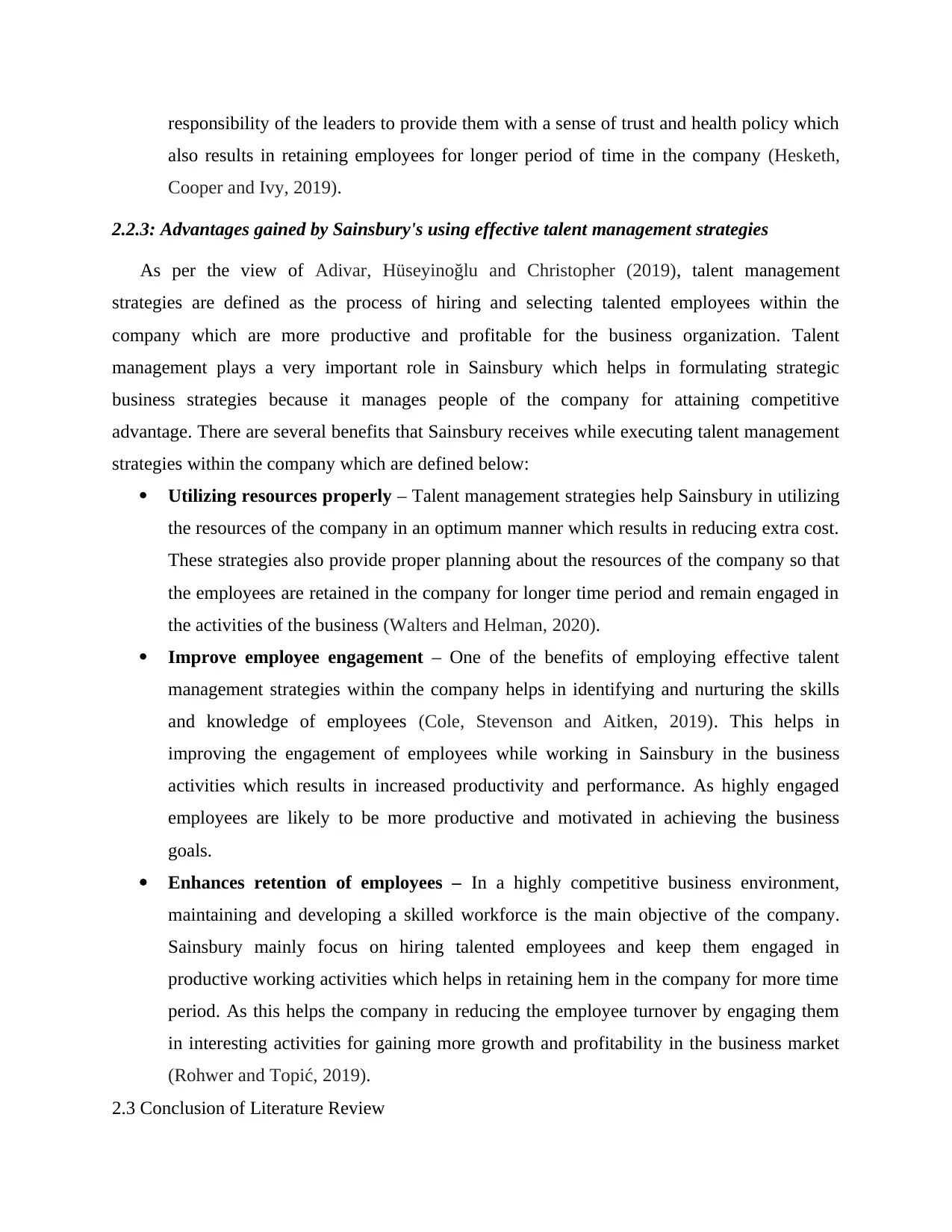
responsibility of the leaders to provide them with a sense of trust and health policy which
also results in retaining employees for longer period of time in the company (Hesketh,
Cooper and Ivy, 2019).
2.2.3: Advantages gained by Sainsbury's using effective talent management strategies
As per the view of Adivar, Hüseyinoğlu and Christopher (2019), talent management
strategies are defined as the process of hiring and selecting talented employees within the
company which are more productive and profitable for the business organization. Talent
management plays a very important role in Sainsbury which helps in formulating strategic
business strategies because it manages people of the company for attaining competitive
advantage. There are several benefits that Sainsbury receives while executing talent management
strategies within the company which are defined below:
Utilizing resources properly – Talent management strategies help Sainsbury in utilizing
the resources of the company in an optimum manner which results in reducing extra cost.
These strategies also provide proper planning about the resources of the company so that
the employees are retained in the company for longer time period and remain engaged in
the activities of the business (Walters and Helman, 2020).
Improve employee engagement – One of the benefits of employing effective talent
management strategies within the company helps in identifying and nurturing the skills
and knowledge of employees (Cole, Stevenson and Aitken, 2019). This helps in
improving the engagement of employees while working in Sainsbury in the business
activities which results in increased productivity and performance. As highly engaged
employees are likely to be more productive and motivated in achieving the business
goals.
Enhances retention of employees – In a highly competitive business environment,
maintaining and developing a skilled workforce is the main objective of the company.
Sainsbury mainly focus on hiring talented employees and keep them engaged in
productive working activities which helps in retaining hem in the company for more time
period. As this helps the company in reducing the employee turnover by engaging them
in interesting activities for gaining more growth and profitability in the business market
(Rohwer and Topić, 2019).
2.3 Conclusion of Literature Review
also results in retaining employees for longer period of time in the company (Hesketh,
Cooper and Ivy, 2019).
2.2.3: Advantages gained by Sainsbury's using effective talent management strategies
As per the view of Adivar, Hüseyinoğlu and Christopher (2019), talent management
strategies are defined as the process of hiring and selecting talented employees within the
company which are more productive and profitable for the business organization. Talent
management plays a very important role in Sainsbury which helps in formulating strategic
business strategies because it manages people of the company for attaining competitive
advantage. There are several benefits that Sainsbury receives while executing talent management
strategies within the company which are defined below:
Utilizing resources properly – Talent management strategies help Sainsbury in utilizing
the resources of the company in an optimum manner which results in reducing extra cost.
These strategies also provide proper planning about the resources of the company so that
the employees are retained in the company for longer time period and remain engaged in
the activities of the business (Walters and Helman, 2020).
Improve employee engagement – One of the benefits of employing effective talent
management strategies within the company helps in identifying and nurturing the skills
and knowledge of employees (Cole, Stevenson and Aitken, 2019). This helps in
improving the engagement of employees while working in Sainsbury in the business
activities which results in increased productivity and performance. As highly engaged
employees are likely to be more productive and motivated in achieving the business
goals.
Enhances retention of employees – In a highly competitive business environment,
maintaining and developing a skilled workforce is the main objective of the company.
Sainsbury mainly focus on hiring talented employees and keep them engaged in
productive working activities which helps in retaining hem in the company for more time
period. As this helps the company in reducing the employee turnover by engaging them
in interesting activities for gaining more growth and profitability in the business market
(Rohwer and Topić, 2019).
2.3 Conclusion of Literature Review
Paraphrase This Document
Need a fresh take? Get an instant paraphrase of this document with our AI Paraphraser
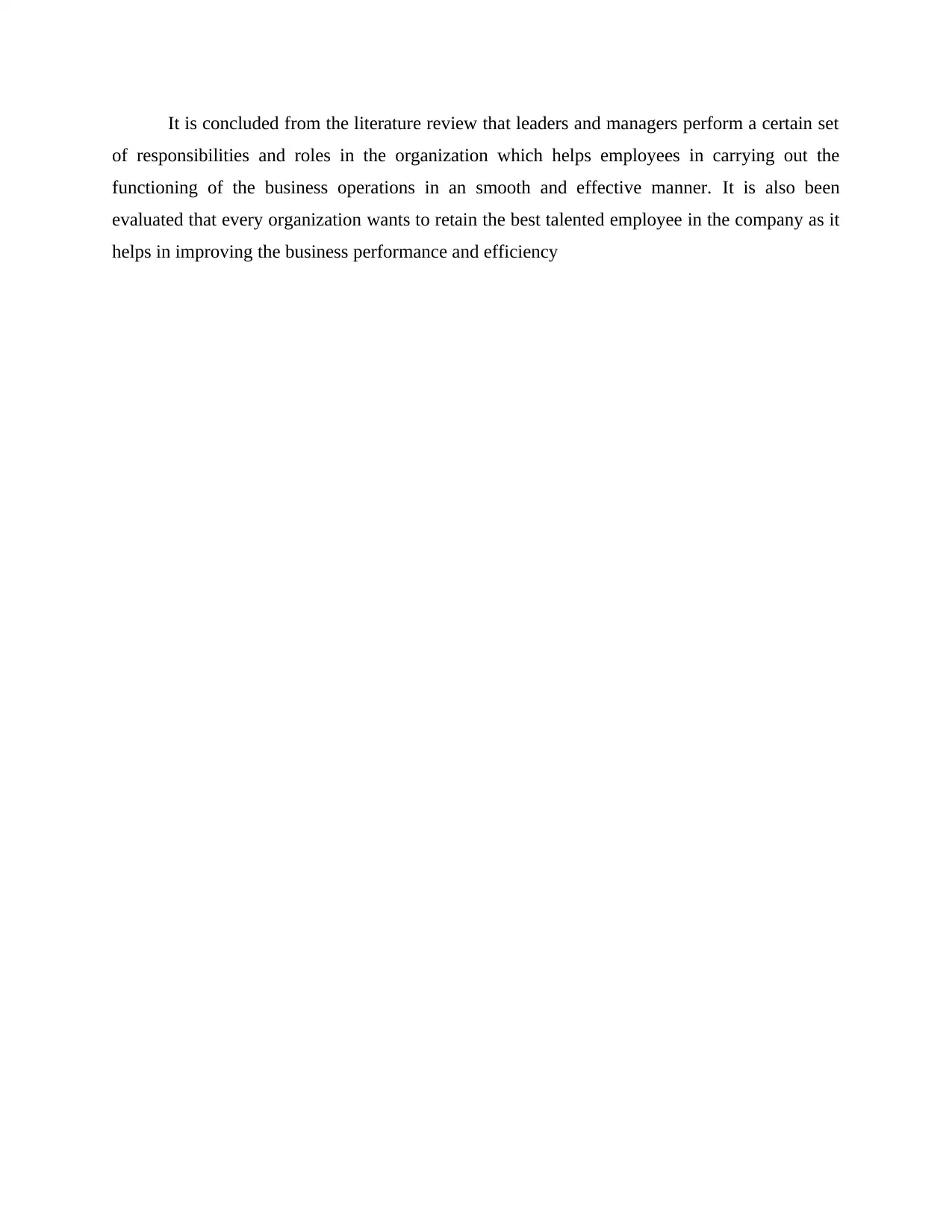
It is concluded from the literature review that leaders and managers perform a certain set
of responsibilities and roles in the organization which helps employees in carrying out the
functioning of the business operations in an smooth and effective manner. It is also been
evaluated that every organization wants to retain the best talented employee in the company as it
helps in improving the business performance and efficiency
of responsibilities and roles in the organization which helps employees in carrying out the
functioning of the business operations in an smooth and effective manner. It is also been
evaluated that every organization wants to retain the best talented employee in the company as it
helps in improving the business performance and efficiency
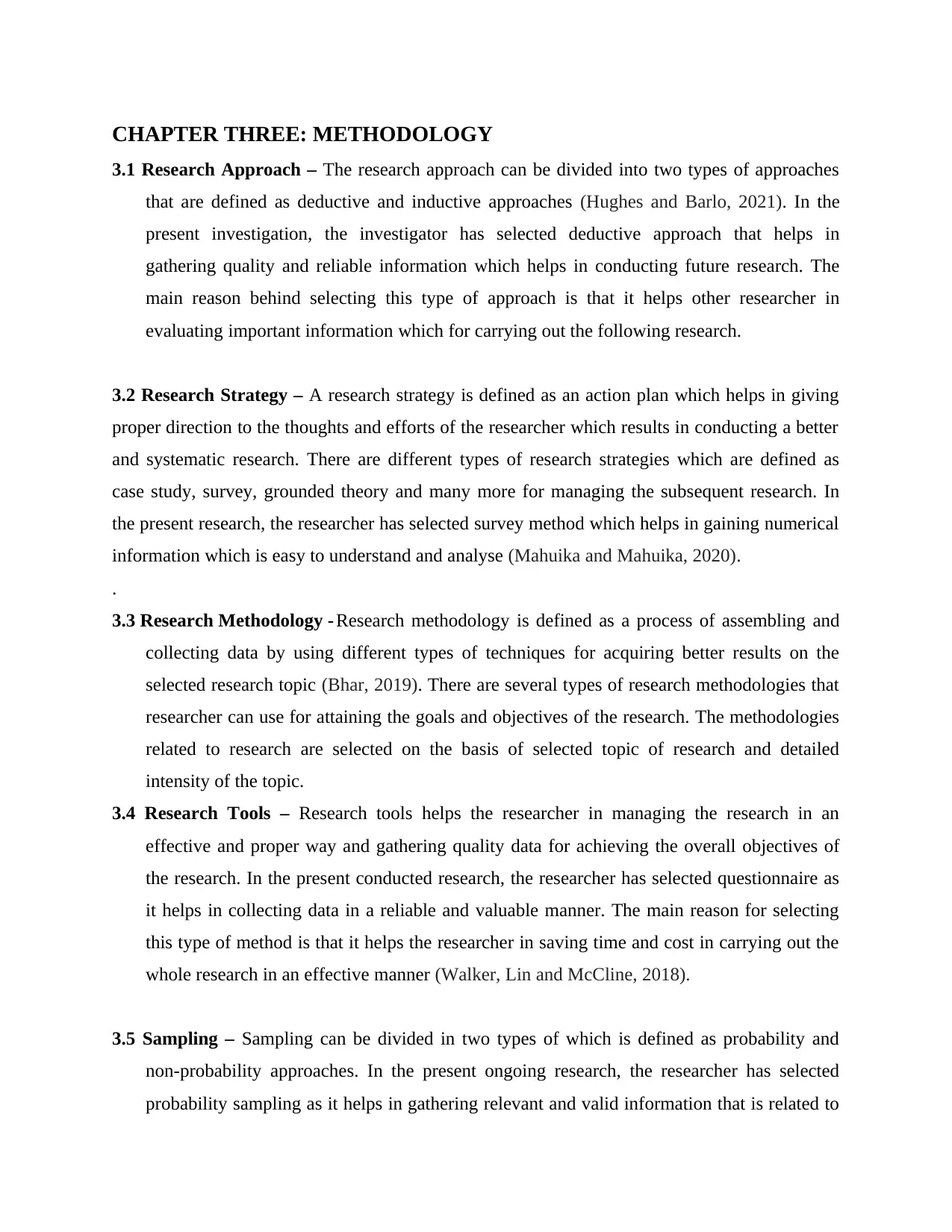
CHAPTER THREE: METHODOLOGY
3.1 Research Approach – The research approach can be divided into two types of approaches
that are defined as deductive and inductive approaches (Hughes and Barlo, 2021). In the
present investigation, the investigator has selected deductive approach that helps in
gathering quality and reliable information which helps in conducting future research. The
main reason behind selecting this type of approach is that it helps other researcher in
evaluating important information which for carrying out the following research.
3.2 Research Strategy – A research strategy is defined as an action plan which helps in giving
proper direction to the thoughts and efforts of the researcher which results in conducting a better
and systematic research. There are different types of research strategies which are defined as
case study, survey, grounded theory and many more for managing the subsequent research. In
the present research, the researcher has selected survey method which helps in gaining numerical
information which is easy to understand and analyse (Mahuika and Mahuika, 2020).
.
3.3 Research Methodology - Research methodology is defined as a process of assembling and
collecting data by using different types of techniques for acquiring better results on the
selected research topic (Bhar, 2019). There are several types of research methodologies that
researcher can use for attaining the goals and objectives of the research. The methodologies
related to research are selected on the basis of selected topic of research and detailed
intensity of the topic.
3.4 Research Tools – Research tools helps the researcher in managing the research in an
effective and proper way and gathering quality data for achieving the overall objectives of
the research. In the present conducted research, the researcher has selected questionnaire as
it helps in collecting data in a reliable and valuable manner. The main reason for selecting
this type of method is that it helps the researcher in saving time and cost in carrying out the
whole research in an effective manner (Walker, Lin and McCline, 2018).
3.5 Sampling – Sampling can be divided in two types of which is defined as probability and
non-probability approaches. In the present ongoing research, the researcher has selected
probability sampling as it helps in gathering relevant and valid information that is related to
3.1 Research Approach – The research approach can be divided into two types of approaches
that are defined as deductive and inductive approaches (Hughes and Barlo, 2021). In the
present investigation, the investigator has selected deductive approach that helps in
gathering quality and reliable information which helps in conducting future research. The
main reason behind selecting this type of approach is that it helps other researcher in
evaluating important information which for carrying out the following research.
3.2 Research Strategy – A research strategy is defined as an action plan which helps in giving
proper direction to the thoughts and efforts of the researcher which results in conducting a better
and systematic research. There are different types of research strategies which are defined as
case study, survey, grounded theory and many more for managing the subsequent research. In
the present research, the researcher has selected survey method which helps in gaining numerical
information which is easy to understand and analyse (Mahuika and Mahuika, 2020).
.
3.3 Research Methodology - Research methodology is defined as a process of assembling and
collecting data by using different types of techniques for acquiring better results on the
selected research topic (Bhar, 2019). There are several types of research methodologies that
researcher can use for attaining the goals and objectives of the research. The methodologies
related to research are selected on the basis of selected topic of research and detailed
intensity of the topic.
3.4 Research Tools – Research tools helps the researcher in managing the research in an
effective and proper way and gathering quality data for achieving the overall objectives of
the research. In the present conducted research, the researcher has selected questionnaire as
it helps in collecting data in a reliable and valuable manner. The main reason for selecting
this type of method is that it helps the researcher in saving time and cost in carrying out the
whole research in an effective manner (Walker, Lin and McCline, 2018).
3.5 Sampling – Sampling can be divided in two types of which is defined as probability and
non-probability approaches. In the present ongoing research, the researcher has selected
probability sampling as it helps in gathering relevant and valid information that is related to
⊘ This is a preview!⊘
Do you want full access?
Subscribe today to unlock all pages.

Trusted by 1+ million students worldwide
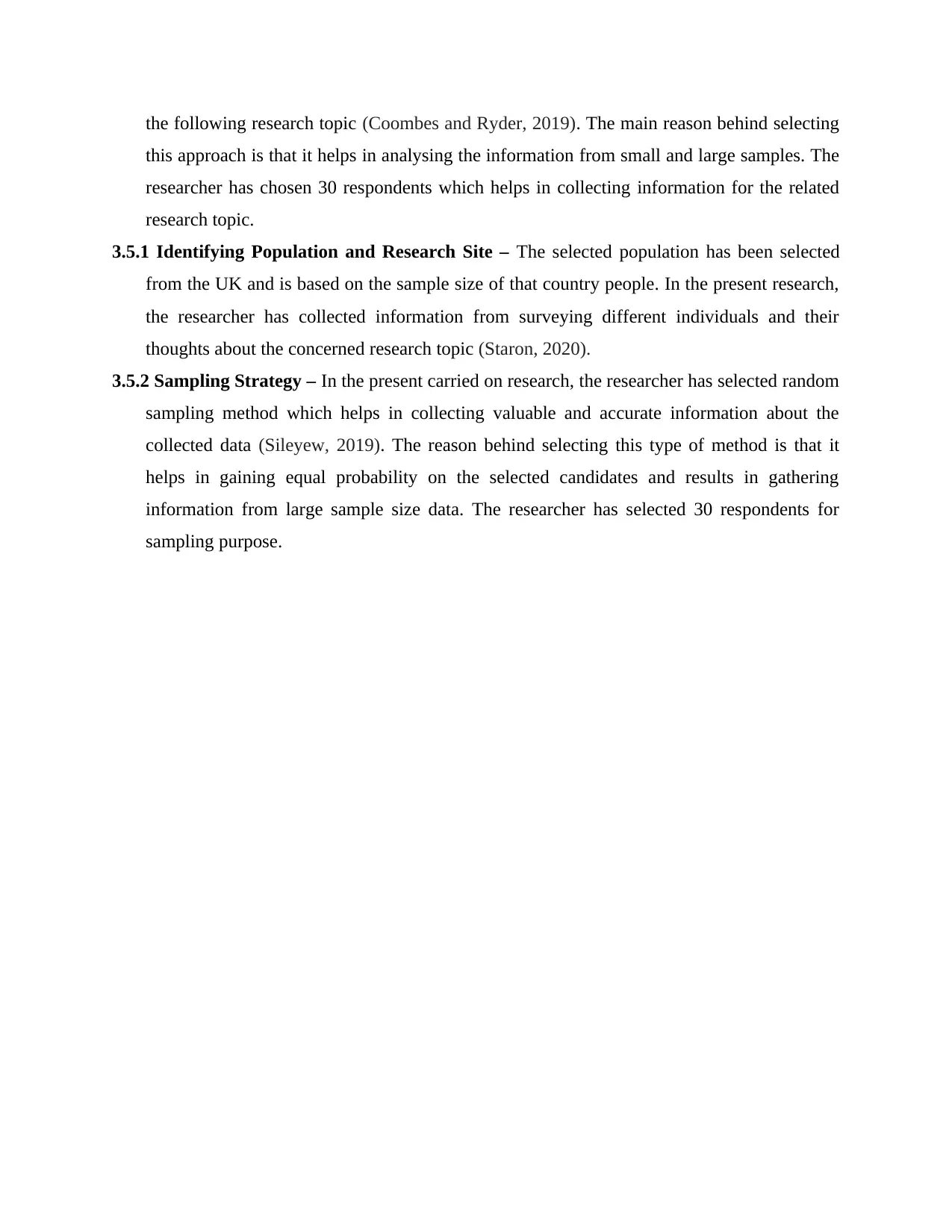
the following research topic (Coombes and Ryder, 2019). The main reason behind selecting
this approach is that it helps in analysing the information from small and large samples. The
researcher has chosen 30 respondents which helps in collecting information for the related
research topic.
3.5.1 Identifying Population and Research Site – The selected population has been selected
from the UK and is based on the sample size of that country people. In the present research,
the researcher has collected information from surveying different individuals and their
thoughts about the concerned research topic (Staron, 2020).
3.5.2 Sampling Strategy – In the present carried on research, the researcher has selected random
sampling method which helps in collecting valuable and accurate information about the
collected data (Sileyew, 2019). The reason behind selecting this type of method is that it
helps in gaining equal probability on the selected candidates and results in gathering
information from large sample size data. The researcher has selected 30 respondents for
sampling purpose.
this approach is that it helps in analysing the information from small and large samples. The
researcher has chosen 30 respondents which helps in collecting information for the related
research topic.
3.5.1 Identifying Population and Research Site – The selected population has been selected
from the UK and is based on the sample size of that country people. In the present research,
the researcher has collected information from surveying different individuals and their
thoughts about the concerned research topic (Staron, 2020).
3.5.2 Sampling Strategy – In the present carried on research, the researcher has selected random
sampling method which helps in collecting valuable and accurate information about the
collected data (Sileyew, 2019). The reason behind selecting this type of method is that it
helps in gaining equal probability on the selected candidates and results in gathering
information from large sample size data. The researcher has selected 30 respondents for
sampling purpose.
Paraphrase This Document
Need a fresh take? Get an instant paraphrase of this document with our AI Paraphraser
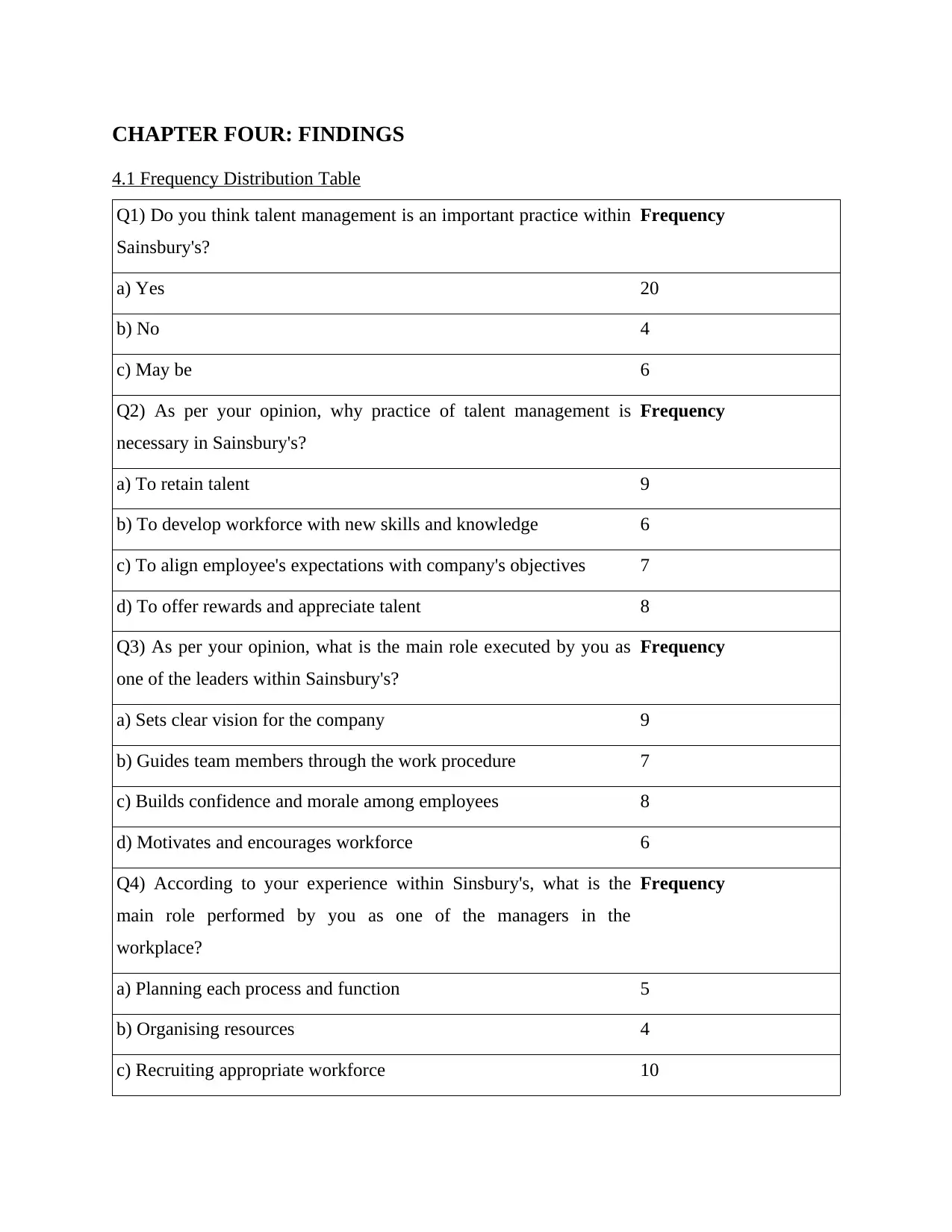
CHAPTER FOUR: FINDINGS
4.1 Frequency Distribution Table
Q1) Do you think talent management is an important practice within
Sainsbury's?
Frequency
a) Yes 20
b) No 4
c) May be 6
Q2) As per your opinion, why practice of talent management is
necessary in Sainsbury's?
Frequency
a) To retain talent 9
b) To develop workforce with new skills and knowledge 6
c) To align employee's expectations with company's objectives 7
d) To offer rewards and appreciate talent 8
Q3) As per your opinion, what is the main role executed by you as
one of the leaders within Sainsbury's?
Frequency
a) Sets clear vision for the company 9
b) Guides team members through the work procedure 7
c) Builds confidence and morale among employees 8
d) Motivates and encourages workforce 6
Q4) According to your experience within Sinsbury's, what is the
main role performed by you as one of the managers in the
workplace?
Frequency
a) Planning each process and function 5
b) Organising resources 4
c) Recruiting appropriate workforce 10
4.1 Frequency Distribution Table
Q1) Do you think talent management is an important practice within
Sainsbury's?
Frequency
a) Yes 20
b) No 4
c) May be 6
Q2) As per your opinion, why practice of talent management is
necessary in Sainsbury's?
Frequency
a) To retain talent 9
b) To develop workforce with new skills and knowledge 6
c) To align employee's expectations with company's objectives 7
d) To offer rewards and appreciate talent 8
Q3) As per your opinion, what is the main role executed by you as
one of the leaders within Sainsbury's?
Frequency
a) Sets clear vision for the company 9
b) Guides team members through the work procedure 7
c) Builds confidence and morale among employees 8
d) Motivates and encourages workforce 6
Q4) According to your experience within Sinsbury's, what is the
main role performed by you as one of the managers in the
workplace?
Frequency
a) Planning each process and function 5
b) Organising resources 4
c) Recruiting appropriate workforce 10
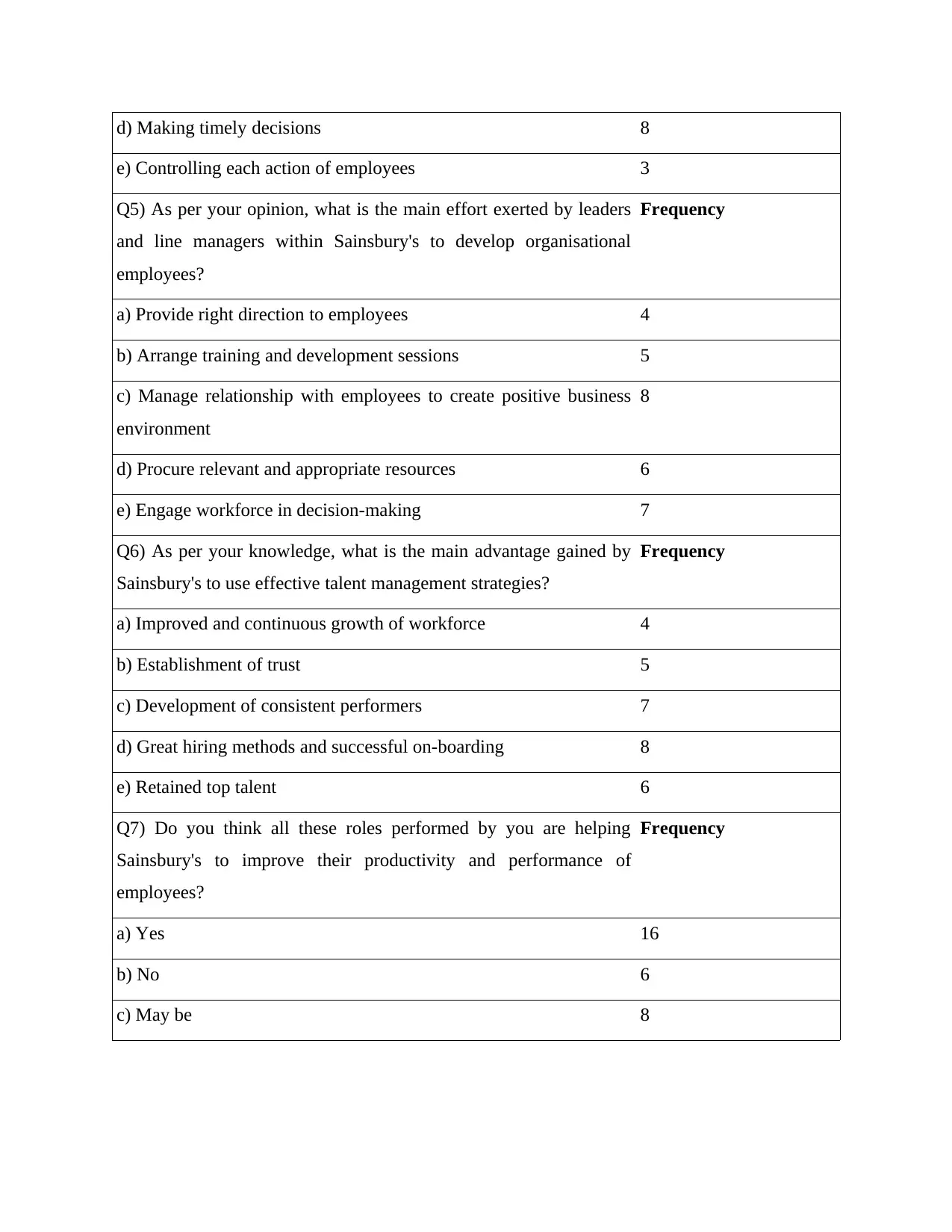
d) Making timely decisions 8
e) Controlling each action of employees 3
Q5) As per your opinion, what is the main effort exerted by leaders
and line managers within Sainsbury's to develop organisational
employees?
Frequency
a) Provide right direction to employees 4
b) Arrange training and development sessions 5
c) Manage relationship with employees to create positive business
environment
8
d) Procure relevant and appropriate resources 6
e) Engage workforce in decision-making 7
Q6) As per your knowledge, what is the main advantage gained by
Sainsbury's to use effective talent management strategies?
Frequency
a) Improved and continuous growth of workforce 4
b) Establishment of trust 5
c) Development of consistent performers 7
d) Great hiring methods and successful on-boarding 8
e) Retained top talent 6
Q7) Do you think all these roles performed by you are helping
Sainsbury's to improve their productivity and performance of
employees?
Frequency
a) Yes 16
b) No 6
c) May be 8
e) Controlling each action of employees 3
Q5) As per your opinion, what is the main effort exerted by leaders
and line managers within Sainsbury's to develop organisational
employees?
Frequency
a) Provide right direction to employees 4
b) Arrange training and development sessions 5
c) Manage relationship with employees to create positive business
environment
8
d) Procure relevant and appropriate resources 6
e) Engage workforce in decision-making 7
Q6) As per your knowledge, what is the main advantage gained by
Sainsbury's to use effective talent management strategies?
Frequency
a) Improved and continuous growth of workforce 4
b) Establishment of trust 5
c) Development of consistent performers 7
d) Great hiring methods and successful on-boarding 8
e) Retained top talent 6
Q7) Do you think all these roles performed by you are helping
Sainsbury's to improve their productivity and performance of
employees?
Frequency
a) Yes 16
b) No 6
c) May be 8
⊘ This is a preview!⊘
Do you want full access?
Subscribe today to unlock all pages.

Trusted by 1+ million students worldwide
1 out of 28
Related Documents
Your All-in-One AI-Powered Toolkit for Academic Success.
+13062052269
info@desklib.com
Available 24*7 on WhatsApp / Email
![[object Object]](/_next/static/media/star-bottom.7253800d.svg)
Unlock your academic potential
Copyright © 2020–2026 A2Z Services. All Rights Reserved. Developed and managed by ZUCOL.




